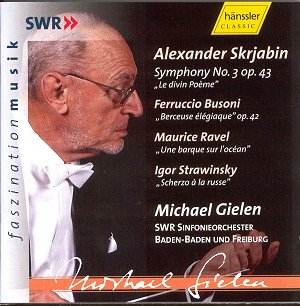The Third Symphony was the last Scriabin wrote.
He was thirty two at the time of its completion in 1904. The Second
had been finished three years earlier and it was around that time
that Scriabin began increasingly immersing himself in philosophical
literature (e.g. Nietzsche), developing and expounding his ideas in
writings of his own. His notion of music as a synthesised art form (drawing
on literary, poetic, philosophical and other elements) that could put
us in touch with some sort of spiritual realm helped him to acquire
something of a cult following. The ideas were not a million miles away
from some of those that Wagner derived from Schopenhauer in writing
Tristan. Tristan can stand as a powerful musical experience
for those who know little of, or don't understand, its Schopenhaueran
origins (the great majority I suspect). Can Scriabin's Third Symphony
stand the same test?
This unwieldy beast of a work was launched on a thermal
of pseudo-metaphysical hot air. I suggest that its potential to stay
aloft (and pass the aforementioned test) depends very much on the conviction
of the performance. The obvious condition for this is a conductor who
really believes in the music and has the ability to convey his/her conviction
to the players. Sadly, this prerequisite does not appear to be in place
here. One has only to take the first few pages of score and compare
Gielenís performance with a recording that has been well regarded for
many years. The late Sir John Pritchard, of all people, in conducting
the BBC Symphony Orchestra, conveys at the opening the clearly intended
aura of mystery and portentousness, then seamlessly moves into the allegro
with admirable inevitability. Scriabinís transitions are not easy to
navigate yet in a work where there are many such moments it is essential
that organic growth is achieved, by whatever skilful sleight of hand,
otherwise the overall structure can become tediously sectionalised.
Gielen does not seem to have what it takes. There is
not the same sense of mystery, and in a work that is melodically cyclical
in nature he still manages to sectionalise it with poorly handled transitions.
Scriabinís vital soaring phrases, musical fingerprints symbolic of an
aspiration to free the spirit, are jumped at by Gielen so they sound
like passing moments rather than an essential part of the narrative.
The playing is competent enough and Scriabinís novel textures often
sound well but there is not the sense of commitment that can be heard
with the BBC players. Also, Pritchard gets a more voluptuous tone from
his strings, employing at times a hint of note sliding that goes well
with the music and is in keeping with the practice of the time. Perhaps
it is no wonder that Gielen does not convey the necessary conviction
for, as outlined in a note in the booklet, he seems to have taken up
the work for the wrong reasons. In a visit to the USA in the early seventies
he says he chose it so as not to do "what everyone else always
plays", and also, "to force myself to learn this kind of piece".
For those who are looking for a Scriabin Third only,
then there are other fine recordings around. A suitably
Russian offering is Pletnevís DG recording with the Russian National
Orchestra. Coupled with an outstanding poème díextase,
the Symphony has a gravitas to it that brings conviction.
For those wanting to come to grips with examples of Scriabinís orchestral
works including all three symphonies, then there is Ricardo Mutiís bargain
EMI two-disc set that brings real excitement to the Third Symphony.
Both have better sound quality.
Back to the Gielen disc. The overall offering makes
for an interesting orchestral recital but again there are better performances
of the fillers. For example, Busoniís atmospheric Berceuse élégiaque
generates much more atmosphere in a recent Chandos recording with
the BBC Philharmonic under Järvi. It seems that Hänssler Classic,
who have a special relationship with the SWR Sinfonieorchester Baden-Baden
und Freiburg Leitung, have simply dug into the orchestraís archives
and served up on one disc an arbitrary collection of recordings made
over many years (the one of the Symphony is over a quarter of
a century old!), all with their former conductor, Michael Gielen.
John Leeman


